Turkey has emerged as the Middle East and North Africa’s largest cryptocurrency market, recording nearly $200 billion in annual transactions, according to new data from Chainalysis.
The country’s volume surpasses all others in the region, accounting for nearly four times that of the United Arab Emirates (UAE), which ranks second with $53 billion.
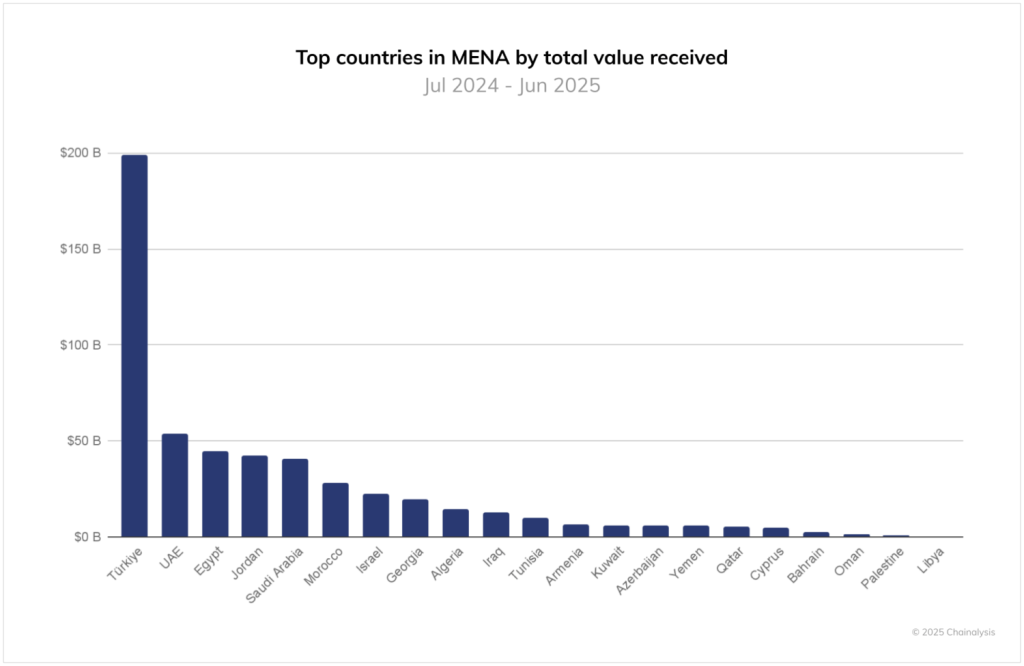
Despite the surge, analysts caution that much of Turkey’s crypto activity appears to be driven by speculative trading rather than sustainable adoption.
From Retail to Institutions—Chainalysis Maps Turkey’s Evolving Crypto Sector
The Chainalysis 2025 Crypto Adoption report shows Turkey’s growing influence across the MENA region, where overall crypto transaction volumes reached more than $60 billion in December 2024, before moderating slightly in 2025.
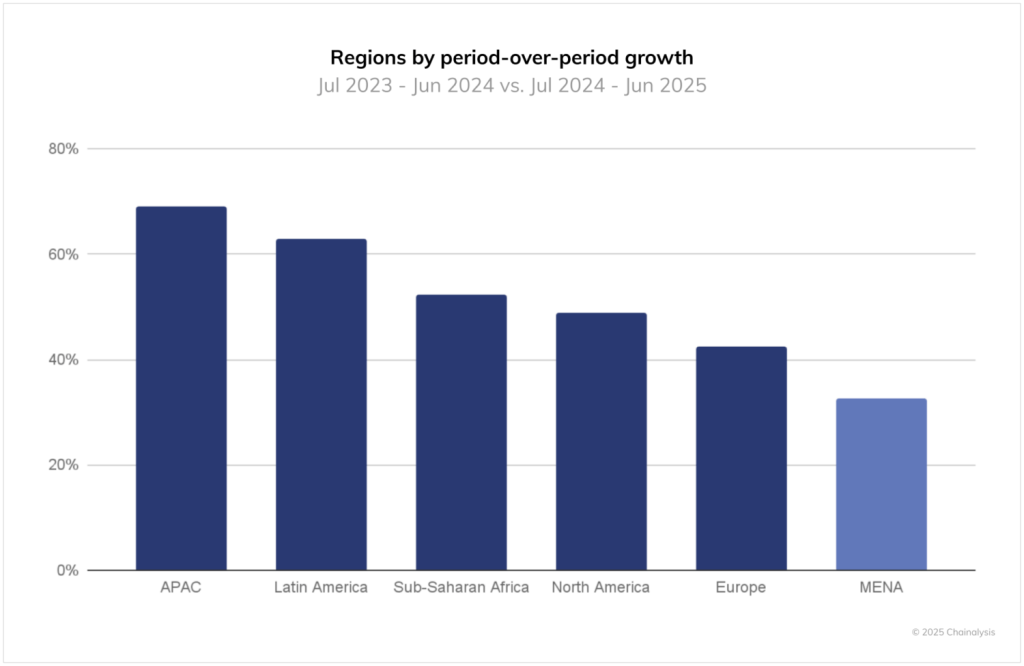
While the region’s year-over-year growth of 33% trails behind developing markets such as Asia-Pacific (69%) and Latin America (63%), the report points to a clear trend: cryptocurrency continues to thrive in MENA despite economic instability and political uncertainty.
Turkey’s case stands out. Since early 2021, the country has seen gross cryptocurrency inflows surpass $878 billion by mid-2025, even as it grapples with steep currency devaluation and persistent double-digit inflation.
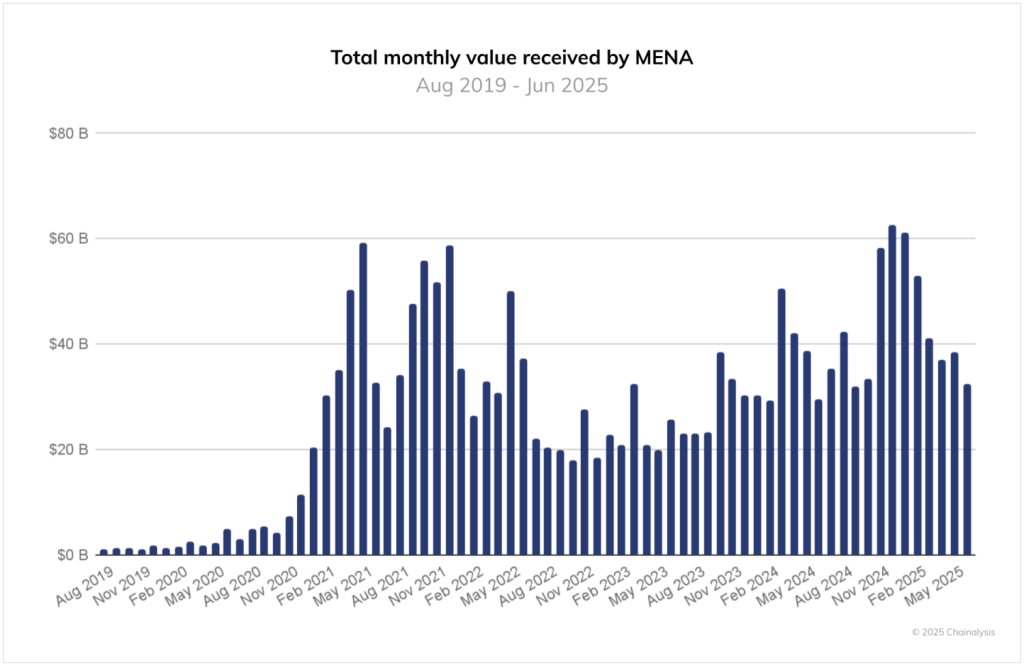
Chainalysis notes that crypto has become a financial refuge for many Turks seeking to preserve wealth or escape financial instability caused by the lira’s depreciation.
However, it also warns that the pattern of trading suggests an increasingly speculative market, particularly as retail participation declines while institutional activity remains strong.
Despite the economic turmoil, Turkish crypto activity has maintained consistent momentum, suggesting that crypto has become a key outlet for both wealth preservation and speculative trading.
However, the report notes a shift in participation patterns. Retail trading activity has slowed sharply, with small and large retail transactions contracting by 1.6% and 2.3%, respectively.
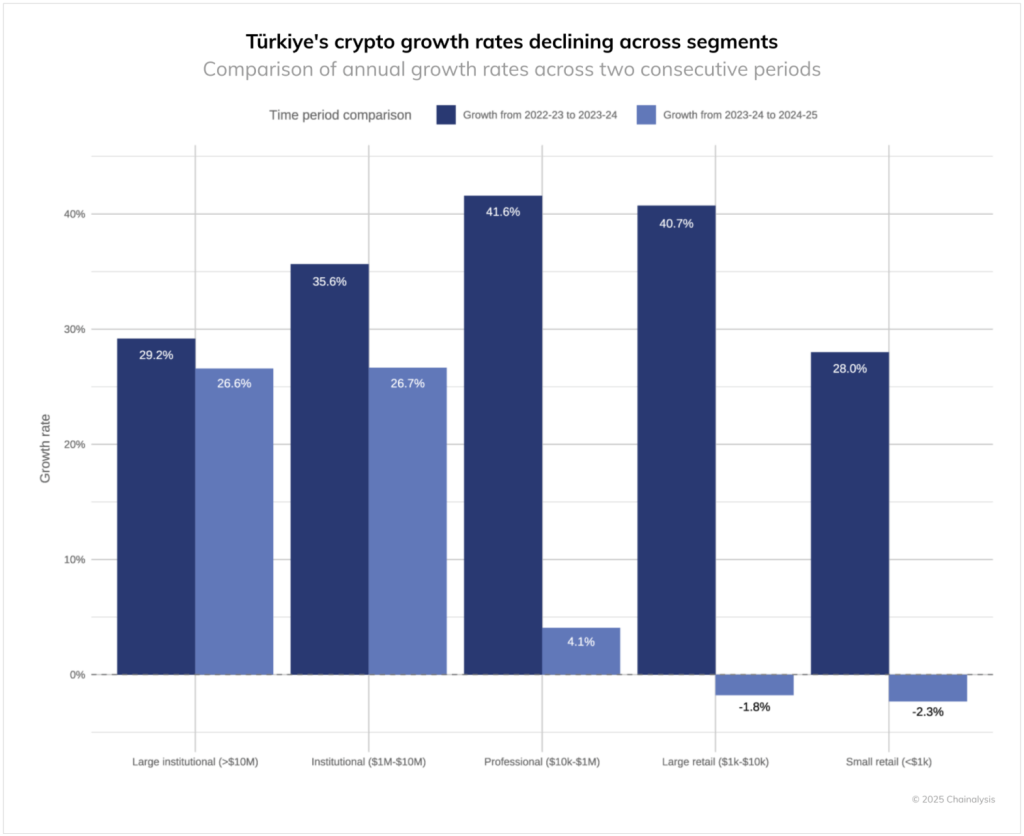
Professional traders also saw growth plummet from over 40% to just 4% year-over-year. In contrast, institutional trading has proven more resilient, as larger players seek inflation hedges and exposure to digital assets.
Chainalysis attributes this shift to affordability issues, tightened regulations, and waning confidence among smaller investors after sustained volatility.
Stricter KYC and Transfer Caps Drive Down Retail Crypto Activity in Turkey
Analysts attribute the decline in retail participation to affordability challenges and tighter regulations introduced by Turkish authorities.
Turkey has tightened its cryptocurrency regulations in 2024 and 2025 to align with global anti-money laundering (AML) and FATF standards, a move analysts say has contributed to declining retail participation.
The new framework introduced stricter KYC rules, withdrawal limits, and reporting requirements for crypto platforms. Transactions above 15,000 Turkish lira (around $360) must include identifying details and a 20-character transaction note.
Withdrawals without full sender and recipient information face delays of up to 48 hours, while new users experience a 72-hour hold.
Authorities also capped stablecoin transfers at $3,000 daily and $50,000 monthly, with higher limits only for providers fully complying with the Travel Rule.
Treasury and Finance Minister Mehmet Şimşek warned that non-compliant firms risk fines, license revocations, or outright bans.
The Financial Crimes Investigation Board (MASAK) has gained new powers to freeze accounts linked to suspicious activity.
In March 2025, Turkey expanded its oversight further through amendments to the Capital Markets Law No. 6362, bringing all crypto exchanges, custodians, and wallet providers under the Capital Markets Board (CMB).
Two communiqués, III-35/B.1 and III-35/B.2, require platforms to operate as joint-stock companies, maintain minimum capital reserves of $4.1 million for exchanges and $13.7 million for custodians, and undergo proof-of-reserve audits.
The reforms also set governance and transparency standards, banning conflicts of interest and mandating user protection mechanisms such as dispute resolution systems, clear risk disclosures, and segregation of customer funds.
Another reason that can lead to the drop in retail activities is the big players’ exit from the nation.
For example, crypto exchange Coinbase has already withdrawn its pre-application to enter Turkey’s crypto market.
Rival exchange Binance also announced that it would terminate its retail referral program in Turkey to comply with local regulations.
Crypto Still Thrives in Turkey Despite Tougher Regulations and Exchange Withdrawals
Despite the heavier regulatory environment, Turkey remains one of the most active crypto markets globally, ranking 14th in Chainalysis’ 2025 Global Crypto Adoption Index.
The government has also floated the idea of a small transaction tax of 0.03% to boost public revenues, though Finance Minister Şimşek has stated that profits on crypto assets are not yet subject to taxation.
Meanwhile, Chainalysis’ analysis of trading behavior suggests that much of Turkey’s market activity has shifted toward speculative altcoin trading.
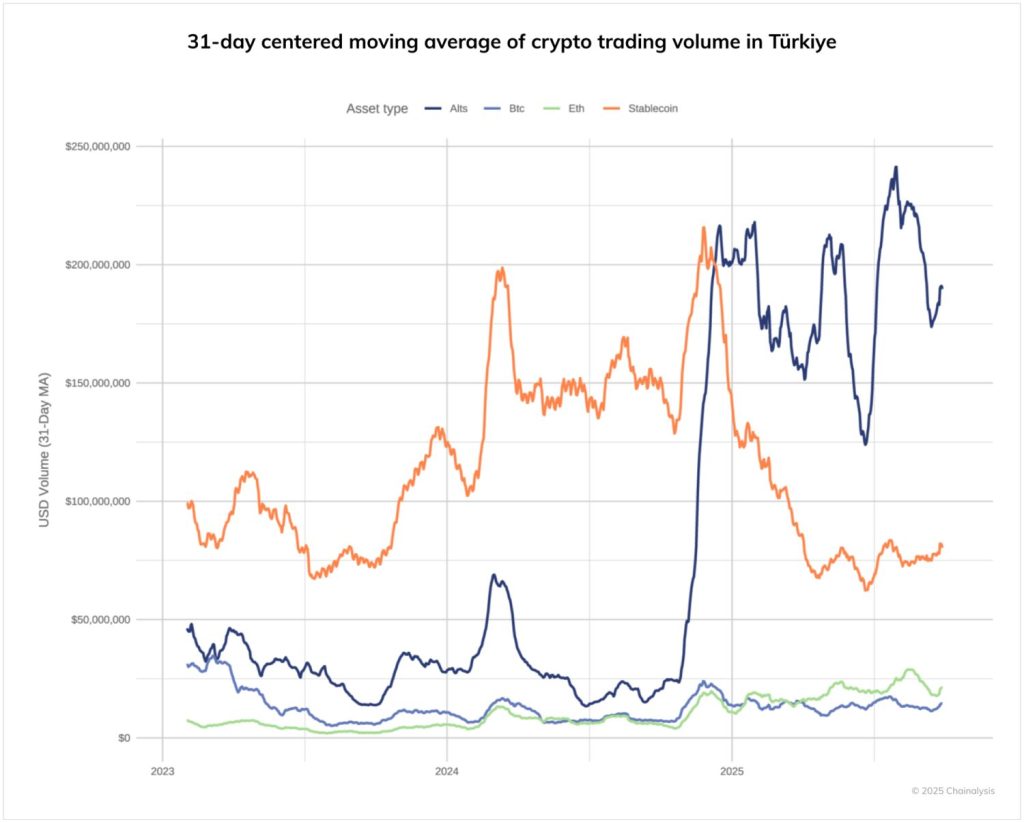
Data from CCData shows that altcoin volumes surged from roughly $50 million in late 2024 to over $240 million by mid-2025, overtaking stablecoins as the most traded asset class.
Analysts view this as a sign of increasing risk-taking among investors seeking higher returns amid economic hardship and tightening regulation.
Across the region, other MENA markets show contrasting patterns.
The UAE’s crypto sector continues to grow steadily under a regulated framework, while Israel’s volumes surged after the October 2023 attacks, as citizens turned to crypto as a financial refuge.
Iran, meanwhile, maintains steady growth despite sanctions, operating within a self-contained ecosystem largely cut off from global exchanges.
The post Turkey Leads MENA with $200B in Crypto Volume – but Chainalysis Warns It’s ‘All Speculation’ appeared first on Cryptonews.
 Turkey is tightening crypto AML regulations! By February 2025, all transactions over 15,000 lira will require user identification.
Turkey is tightening crypto AML regulations! By February 2025, all transactions over 15,000 lira will require user identification. Turkey has enacted strict crypto oversight with mandatory source checks and a $3K daily stablecoin limit.
Turkey has enacted strict crypto oversight with mandatory source checks and a $3K daily stablecoin limit.





